Lead story
Review of the Standardisation Regulation
The European Commission (EC) announced earlier this year that it planned to launch a review of Regulation (EU) 1025/2012 – the Standardisation Regulation – by Q4/2023.
A first step has now been taken. On 1 September, the EC launched a “Call for Evidence”. See https://tinyurl.com/3tf6b929. Essentially, this seeks the support of citizens and stakeholders for the review. Later steps will include a public consultation, targeted surveys, interviews (including with ANEC) and a validation workshop.
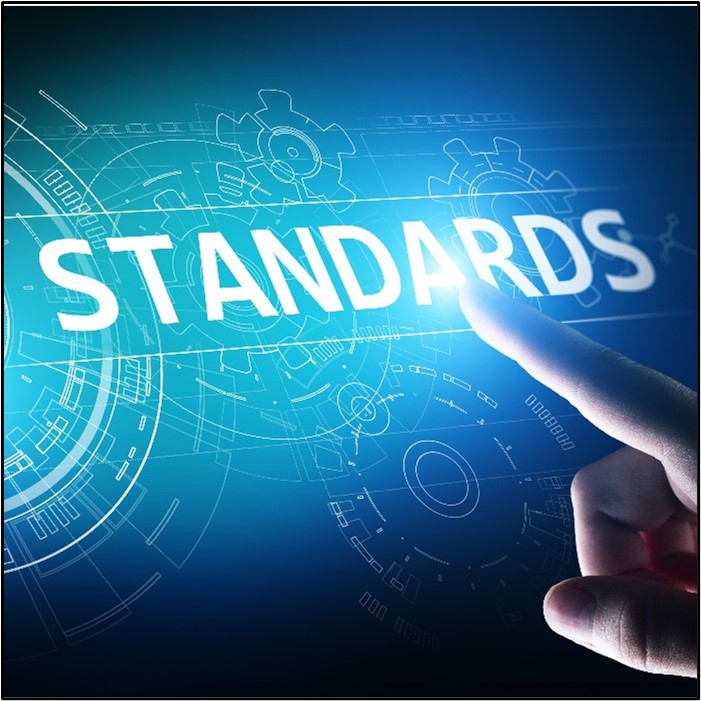
The publication of the Standardisation Strategy in 2022 and its promotion of international standardisation – despite a background of sometimes unfavourable geopolitics – coupled with an extension of the New Legislative Framework (legislation supported by standards) to controversial fields such as fundamental rights within the context of the AI Act, lead us to believe the Regulation needs to be revised to reinforce the protection of the public interest and also place a limit on what is “standardisable”.
Consequently, ANEC confirms its wish for the review of the Regulation to take place.
Horizontal
The common charger
We welcome EC Delegated Regulation (EU) 2023/1717, amending the ‘Common Charger’ Directive (EU) 2022/2380 as regards the references to technical specifications for wired charging, has been published in the Official Journal of the European Union (https://tinyurl.com/26hrrzub). ANEC supported the reference to the updated standards.

Common chargers for several consumer products will become mandatory at the end of 2024. Smart phones, tablets and similar products will have to comply with CEN-CENELEC standards on USB-C and speed charging capabilities (IEC 62680-1).
These standards were updated at the end of last year and hence the EC undertook a consultation on their suitability to be referenced in legislation on the common charger (introduced by the revised Radio Equipment Directive).
These updated specifications extend the range of power supported up to 240W, relevant for the charging of laptops.
Child Safety
Toys - groundbreaking EC proposal
On 28 July, the EC published its proposal for a Toy Safety Regulation. On the same day, we issued an Press Release with BEUC (https://tinyurl.com/5n6efx6y), welcoming the proposal. If the proposal becomes law, it would be the first time – worldwide – that both known and suspected hormone-disrupting chemicals are banned from an entire product group. In addition to the ban, we also support a proposed Digital Product Passport for toys, which should help authorities better trace products in the supply chain and enforce legislation.
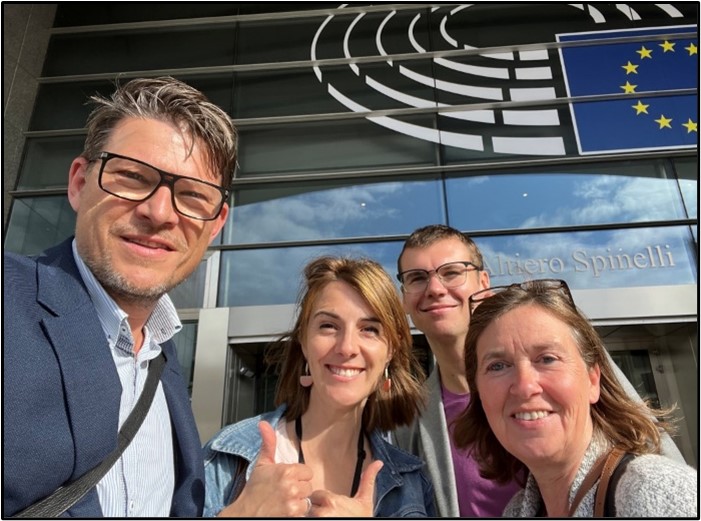
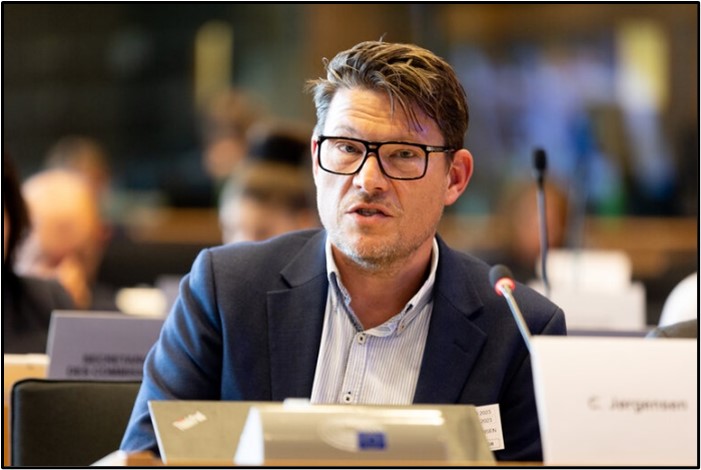
Image ©European Parliament
A Public Consultation (https://tinyurl.com/yckecvft) is currently running. ANEC will work closely together with BEUC in submitting its reply. A members and experts’ conference call was held on 21 September to further discuss the ANEC/BEUC positions.
In light of the publication of the EC Proposal, the European Parliament’s Internal Market and Consumer Protection Committee (IMCO) organized a Hearing on ‘Toy Safety’ on 19 September at which ANEC and BEUC both spoke. ANEC’s expert on chemicals in toys, Claus Jørgensen, participated in the 1st panel which focussed on the protection of children against risks in toys. Florence Punzano spoke on behalf of BEUC during the 2nd panel, addressing strengthening the Single Market for toys.
On the occasion of the EP IMCO Hearing, we published a joint written ANEC-BEUC statement (https://tinyurl.com/ytedbmu) applauding the EC proposal. As the provisions included in the draft text represent a major step forward for the protection of children, ANEC and BEUC call on the Parliament to adopt its position quickly, so that a negotiating mandate can be established before the European elections next year.
Accessibility
ANEC supports prEN 17984-6
ANEC is active in CEN/TC 452 ‘Assistance Dogs’, in collaboration with the European Guide Dog Federation. The term “assistance dogs” covers any dog that assists people with sensory, physical, mobility impairments or other medical, mental health or development impairments.

Specifically, ANEC contributed to the drafting of the standard prEN 17984-6 ‘Assistance dogs - Part 6: Accessibility and Universal Access’ ‘Assistance dogs –Accessibility and Universal Access’, as it is important that the users of assistance dogs, and the dogs themselves, have access to public and private spaces across Europe. The standard was out for Enquiry until 5 October. We supported approval of the standard.
Additionally, we are also supporting prEN 17984-1:2023 ‘Vocabulary’ which harmonises the terminology referring to dogs that are specifically trained to perform tasks that increase independence and mitigate limitations of a person with a disability.
Domestic Appliances
SReq on gas appliances
ANEC notes with satisfaction the adoption by the EC Committee on Standards (CoS) in July, and subsequent acceptance by CEN-CENELEC (August), of the Standardisation Request (SReq) related to the Gas Appliances Regulation (2016/426/EU).

The aim of the SReq is to review existing harmonised standards, to adopt necessary amendments or revisions to these standards, or elaborate new harmonised standards. ANEC will follow developments. The SReq addresses several of ANEC’s previous concerns and proposals, especially on the dangers of carbon monoxide (CO) and need to limit surface temperatures.
ANEC supported adoption of the SReq in the consultations of both the CoS and CEN-CENELEC.
Sustainability & Domestic Appliances
ANEC Working Groups meet on common topics
On 28 September, a joint meeting of the ANEC Domestic Appliances and Sustainability Working Groups discussed topics of common interest for the WGs.

These included updates on the Ecodesign for Sustainable Products Regulation (ESPR) proposal, and ongoing activities with BEUC on the implementation of Ecodesign policy measures, such as the ANEC/BEUC response to the Commission consultation on Ecodesign and the energy labelling of cooking appliances. The new ReaLIFEstandards project with ECOS (https://ecostandard.org/realifestandards/) was also reviewed, as were the safety of repaired and refurbished household appliances, batteries, PROSAFE Market Surveillance projects and Premature Obsolescence.
Sustainability
ANEC Sustainability WG meets
Experts from the ANEC Sustainability WG met on 27-28 September with a full agenda that focussed on chemicals, from EU legislation to national updates on testing.

We were joined by a BEUC colleague who updated the group on, “What Consumers say about Safe and Sustainable Food Packaging”. Our activities on Circular Economy and sustainable construction were covered, as well as climate change and sustainable transport. The meeting ended with a review of environmental labelling and packaging waste initiatives and look into the future.
IMCO accepts our proposals on packaging rules
During the summer, three European Parliament Committees (IMCO, AGRI and ITRE) adopted their opinions on the Draft Report of the ENVI Committee on the EC proposal for a Packaging and Packaging Waste Regulation (PPWR), with opportunity to reflect the proposals made by ANEC in our position paper (https://tinyurl.com/fp9hrr9k).

We succeeded in influencing the now-adopted IMCO opinion (https://tinyurl.com/2zf3kp7j) with our recommendations reflected in the alternative compromise amendments put forward by the main groups (EPP, S&D, RE, Greens). Improvements to the text focus on labelling and consumer information, including presence of hazardous substances, governance and – to some extent - reuse targets.
The next step is the upcoming vote in the ENVI committee on the main EP report. The vote is scheduled for to 23-24 October. In the meantime, we call on MEPs to note the following key points above all:
- Supporting the banning of PFAS and bisphenols from packaging (proposed by ENVI rapporteur);
- Dismissing compromise amendments that ask for only plastic packaging to follow reduction requirements. Such requirements should cover ALL packaging.
Role of extended producer responsibility
On 6 September, ANEC Programme Manager for Sustainability & Services, Michela Vuerich, participated in the meeting “Embracing Circularity: PRO Insights on PPWR for Sustainable Packaging" organised by Citeo x Expra (Extended Producers Responsibility Alliance).
Two panels discussed respectively the role of Extended Producer Responsibility (EPR) to reduce and reuse packaging, and how to improve waste collection and Recycling (also with the support of deposit return systems, DRS).
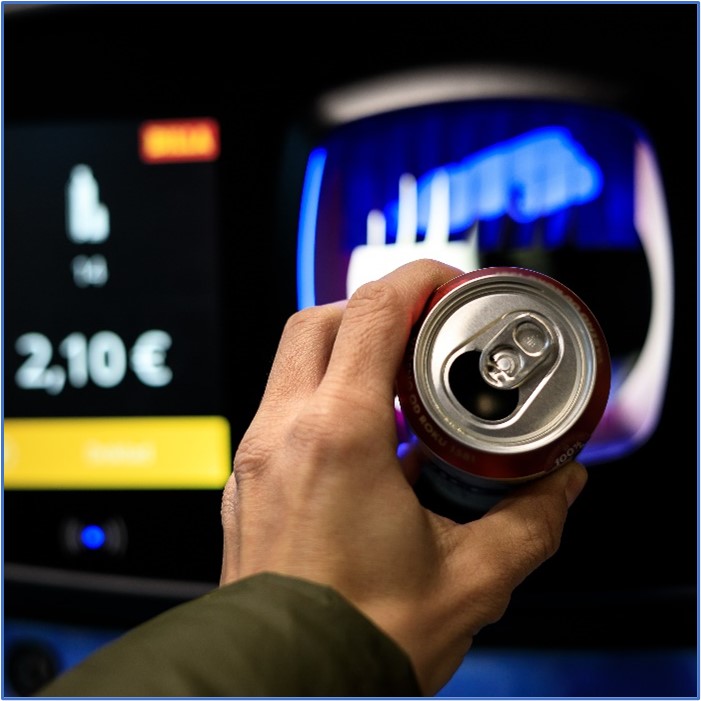
Michela intervened in reaction to the second panel and mentioned that, in our view, it is key from a consumer perspective that any deposit and return schemes are affordable, easy-to use and accessible. She stressed that we call on DRS not to require the use of smartphones, and be as easy as possible and close to home. She added that harmonised labelling and awareness raising are important, and the latter needs to be adaptable to the national situation.
As regards recycling, Michela welcomed the agreement of most speakers to recycling not being an end in itself. Our concern as a consumer organisation is that we need to address chemical safety in the design phase, and phase out hazardous substances, to ensure consumer trust and protection against risks to health.
We continue collaborating on chemical safety and claims of recycled content with other CSOs, such as Zero Waste Europe (https://tinyurl.com/bdd6tbct).
SmartLivingEPC - 3rd General Assembly:
The SmartLivingEPC project hosted its 3rd General Assembly on 20 & 21 September in Tallinn, Estonia.
Project partners were invited to visit one of the project’s demonstration sites: the Ehituse Mäemaja, one of the newest buildings of the Tallinn University of Technology (TalTech). This modern office and laboratory building was constructed in 2020 and fulfils the Nearly zero-energy buildings requirements (or EPC class A), in force in Estonia since 2020. The building also produces solar electricity, using the entire roof surface, and is equipped with numerous other technological features ensuring energy efficiency and the comfort of its occupants.

The pilot site is a great asset to the SmartLivingEPC project, which aims to deliver a certificate that will be issued with the use of digitised tools. The scope of the certificate will also cover non-energy aspects, such as water consumption, noise pollution and acoustics.
The SmartLivingEPC consortium is also active in standardisation and is looking to contribute the project results into CEN/TC 371/WG5 which is developing the first European standard for the operational rating of the energy performance of buildings. ANEC joined WG5 in the summer to contribute the consumer voice to this standardisation deliverable, and to facilitate the cooperation of WG5 with the consortium.
Chemicals
Human Exposure to BPA
On 14 September, the European Environmental Agency (EEA) released its briefing, ‘Human exposure to Bisphenol A in Europe’ (https://tinyurl.com/3ma4n269).

According to the briefing, the most recent data from an EU human biomonitoring study (EU-funded research project - HBM4EU) showed that almost all of the participants from 11 EU countries had BPA levels in their bodies that exceeded safe health limits. This poses serious health implications for the wider EU population. The briefing also emphasised the possible health risks of being exposed to unsafe BPA levels. More details can be found on EEA Press Release (https://tinyurl.com/42p98vss).
BPAs in Food Contact Materials
At a European Parliament meeting in June on the Safety of food packaging attended by ANEC (https://tinyurl.com/awv3te3b), the EC announced its intention to ban the use of BPA in food contact materials (FCMs) such as plastic bottles, cans, and containers. The EC will propose to amend Regulation (EC) No 1935/2004 on materials and articles intended to come into contact with food, and to prohibit the use of BPA as a monomer or an additive in FCMs. The proposal will be based on the precautionary principle and latest scientific evidence on the hazards of BPA (see EFSA scientific opinion: https://tinyurl.com/bdhe9nsx).

The EC proposal is expected to be adopted by the end of 2023, after consultation with the Parliament and the Council. The proposal will also set a transition period for manufacturers and retailers to comply with the new rules and to ensure the availability of safe alternatives. Measures should thus address other bisphenols at the same time. This proposal comes at a time when the European Parliament ENVI committee has also expressed its concerns about the health and environmental risks of BPA and other endocrine disruptors in FCMs, and calling on the EC to take urgent action to address them in the Packaging and Packaging Waste Regulation. This debate is still ongoing in the EP and Council, as noted “Sustainability” above.
Ecodesign
ANEC paper on Ecodesign requirements for computers
Personal computers have become an indispensable appliance in daily life. From an environmental perspective, there are benefits to digitalisation, starting with reduced paper consumption. But our computers might not be as energy and materially-efficient as we think. In our position paper (https://tinyurl.com/3wjb5f88), published on Zero-Emission Day (21 September), we argue that the current Ecodesign regulation on computers is insufficient, and significantly more savings could be achieved with a revised regulatory framework.

One of the largest missed savings comes from not tackling energy efficiency when computers are working, the reason being that there are no standardised test procedures.
ANEC therefore calls for a revision of the Ecodesign Regulation on computers, to ensure that requirements will be robust enough to improve the performance of computers and make a difference in the energy savings for consumers. We also call for the development of a new standards for computers and servers that should exhibit sufficient robustness over time, so that consumers are always provided an accurate idea of how much energy their new products will use under different use functions.
Cooking appliances
In collaboration with BEUC, we developed our contribution to a consultation on Ecodesign and energy labelling of cooking appliances (https://tinyurl.com/4f48fdc2) that ran until the end of August.
In our response we request the Commission to initiate a debate on potentially phasing-out the sale of gas cooking appliances in the EU under these regulations.

We continue discussing with our members the advantages and disadvantages of a phase-out. It could potentially also introduce improvements to indoor air quality, in addition to energy savings. Several studies, including the CLASP/ECHA study "Exposing the Hidden Health Impacts of Cooking with Gas" (see https://bit.ly/3GRI1Yr) to which ANEC also contributed, show how all gas cooking appliances release pollutants that are harmful to human health and the environment, polluting our households with high-risk levels of PM2.5 and/or NO2. Until a phase-out happens, we believe the EC should introduce NO2 and CO limit values in line with WHO guidance.
Ecodesign of smartphones and tablets
The EC has approved new Ecodesign and Energy labelling Regulations for smartphones and tablets, set to take effect in June 2025. We welcome the stringent requirements aimed at enhancing the durability, repairability, and energy efficiency of mobile devices. These requirements encompass provisions such as improved resistance to drops, scratches, and environmental factors – including dust and water - as well as the use of long-lasting batteries.
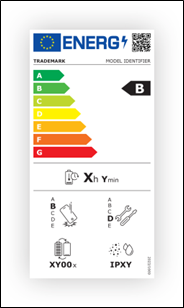 (Image from Commission website)
(Image from Commission website)
Manufacturers will be obliged to make critical spare parts available to repairers within specified timeframes, up to 7 years after a product's market debut. Additionally, devices must receive operating system updates for a minimum of 5 years post-market launch. Furthermore, an energy label will display information on energy efficiency, battery life, and device durability, including – for the first time - a repairability score. For further details, refer to the Commission's communication (https://tinyurl.com/37hn27m6).
In collaboration with BEUC, ANEC contributed (https://tinyurl.com/k68hmyv2) to the development of these measures.
Digital Society
EC Draft SReq for the CRA
ANEC has expressed concern that this SReq has been issued while the Cyber Resilience Act (CRA) is still under discussion by the co-legislators. Many definitions and requirements could change during this consideration, making the standards drafted potentially out-of-scope and in need of redrafting to become Harmonised Standards. In addition, the publication of the standards could put pressure on the co-legislators not to change the original EC proposal.

ANEC has also suggested to strengthen some provisions as the public interest needs to take a prominent role in the execution of this SReq, given its importance to the development and the use of cybersecurity measures. The United Nations Convention on the Rights of Persons with Disabilities should also be taken into account when drafting the standards. The standards and standardisation deliverables to be developed in answer to this request need to conform to EU law on fundamental rights and data protection. Moreover, it is necessary to ensure the role and contribution of civil society stakeholders in the development of standards are strengthened, through the enhanced financial support to the organisations representing them.
Although welcoming the risk-based approach in principle, we think the security requirements should be clearer. We suggest changing ‘appropriate’ into ‘level of cybersecurity proportionate’ in order to make the risk assessment more objective for both manufacturers and the European Standardisation Organisations (ESOs).
Services
Transparency of short term rentals
The Internal Market and Consumer Protection Committee (IMCO) has adopted its position on the EC proposal to establish uniform regulations for short-term rentals (STRs) across the EU (https://tinyurl.com/3un4w7kd).
This regulation aims to increase transparency in the STR market, primarily facilitated by platforms like Airbnb and Booking which have expanded to approximately 25% of tourist accommodation in the EU. The report, supported by MEPs with an overwhelming majority, includes simplified online registration for STR properties, with authorities verifying the provided data. Online platforms must ensure accurate host information. The goal is to balance STR growth with protecting local communities and housing markets. The negotiating mandate now awaits confirmation by the Parliament plenary, followed by negotiations with the Council.

We welcome the opinion supporting several proposals put forward by ANEC (https://tinyurl.com/mrv6nb8s). These include the need for platforms to have an effective complaints system, and to provide clear consumer information on rights and obligations. The opinion also advocates for platforms to inform consumers about their contractual terms, consumer protection rules, and dispute resolution options. Additionally, it agrees with our call for platforms to share pertinent data with public authorities to aid tourism policies. This includes establishing a shared data framework, and cooperation mechanism for addressing illegal listings and enforcing local regulations.
However, ANEC had hoped for more ambitious changes to other consumer-relevant aspects. The opinion doesn't include the sharing of provider status and accommodation type information with consumers. Moreover, it fails to address safety concerns related to accommodation, such as fire and swimming pool safety, instead suggesting cooperation with public authorities for compliance with local standards.
Although we had anticipated a more comprehensive revision of the EC proposal from a consumer perspective, we acknowledge that the focus of this legislation is primarily-centred on enhancing data transparency.
eVehicles
During the summer, ANEC participated in the Fire Information Exchange Platform (FIEP) webinar, 'eVehicles in Closed Car Parks and Fire Safety'.
The meeting discussed risk and firefighting techniques in respect of Electric Vehicles (eV’s) in enclosed car parks. The EC intends to provide draft recommendations to Member States on the subject by end of 2023 and official guidance by mid-next year. ANEC indicated during the meeting that, when developing guidance, it may be advantageous to include the perspective of consumers.
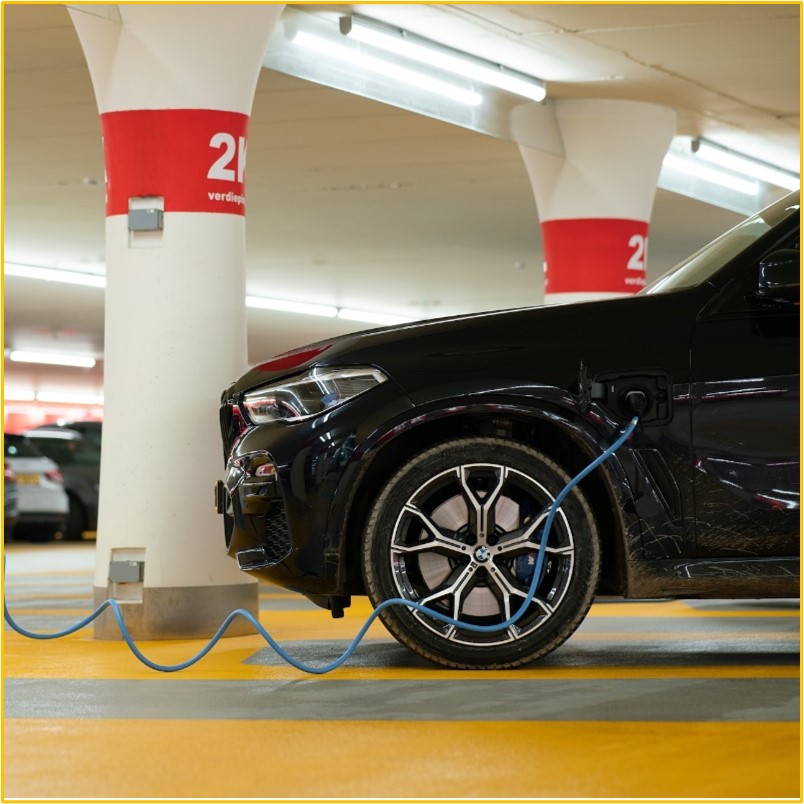
The Commission has also issued a survey (https://tinyurl.com/4fpy5xvb) on "Mapping of legislation/guidelines/codes relating to fire safety for recharging infrastructure and electric vehicles in covered parking areas" in the context of the Sustainable Transport Forum (STF) to collect more data from Member States.
Megatrends in the postal market
A prospective study of the European postal sector (https://tinyurl.com/mr29w5zd) by the EC is intended to explore possible scenarios for the future of the sector based on different trends. To inform the study, the EC opened a survey on future mega trends in the postal market until 11 September. In consultation with its Services WG experts, ANEC prepared a response to the survey.

The survey aimed to reinforce the findings from a workshop in June 2023 which identified key Megatrends affecting the EU postal sector, including technology-driven changes, growing consumption, climate concerns, urbanization, shifting work dynamics, demographic imbalances, migration, and inequalities. These trends are expected to reshape postal services, with technology reducing traditional mail demand but increasing e-commerce deliveries. The quality of service for parcels may improve, with same-day delivery becoming standard, but "slow consumption" with less frequent and slower deliveries may also gain traction to reduce environmental impacts. In our response, we confirmed the trends identified in the workshop but also stressed that vulnerable consumers - with limited access to electronic communications - will still need reliable postal services.
In parallel, we continue following CEN/TC 331 ‘Postal services’ which is now looking into starting new standardisation work on the letter delivery environmental footprint, and methods of proof of delivery without physical signature.
Traffic & Mobility
Supporting sustainable and safe travel
For the 2023 edition of Mobility Week, which took place between the 16 and 22 September, the chosen theme was “Save energy”. Energy and mobility poverty are rising due to higher costs for consumers and businesses across Europe, so it is crucial to opt for sustainable and energy efficient modes of transportation.

In a social media campaign during European Mobility Week, ANEC recognised that public transport has a huge potential to decarbonise transportation. But we also argued that, to change their mobility habits and make sustainable choices, consumers need travel options that are safe and comfortable for everyone, including children.
Although travelling by bus is considered one of the safest modes of transport, young children still face a higher risk of serious injury in the event of an accident, often due to the absence of restraint systems. Through our involvement in the informal group on Safer Transport of Children in Buses and Coaches in UNECE, ANEC is working on child restraint solutions for public road transport. Our primary aim is to promote a concept that is safe and easy to use, for both parents and children, and which does not require parents to bring their own device. Our efforts are proving successful, and a new regulatory text introducing built-in systems was adopted in May 2023.
The informal group is now reaching for its next milestone and started to work on the phase 2, which will allow standalone child restraint systems to be fitted with 2-point belt systems.
In the light of this work, ANEC is helping parents and care-givers to transport children safely in buses and coaches.
| List of meetings 2023 |
For comments or if you wish to write an article for the ANEC Newsletter, please contact: Helena CLARK (This email address is being protected from spambots. You need JavaScript enabled to view it.).


